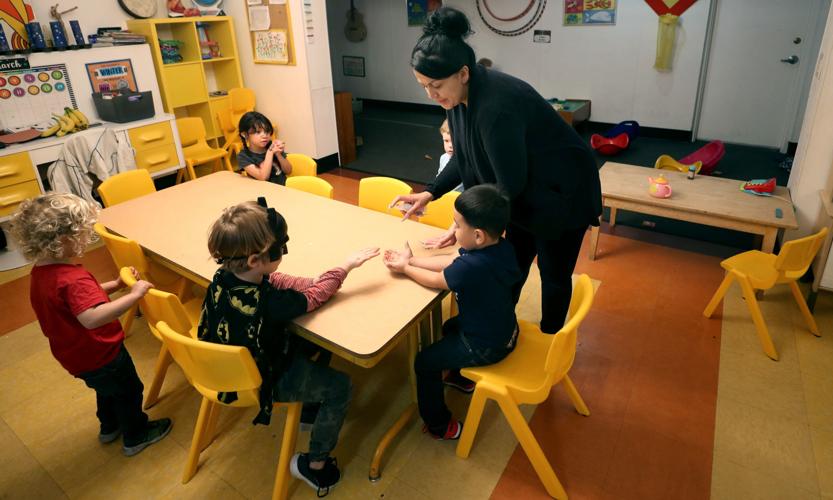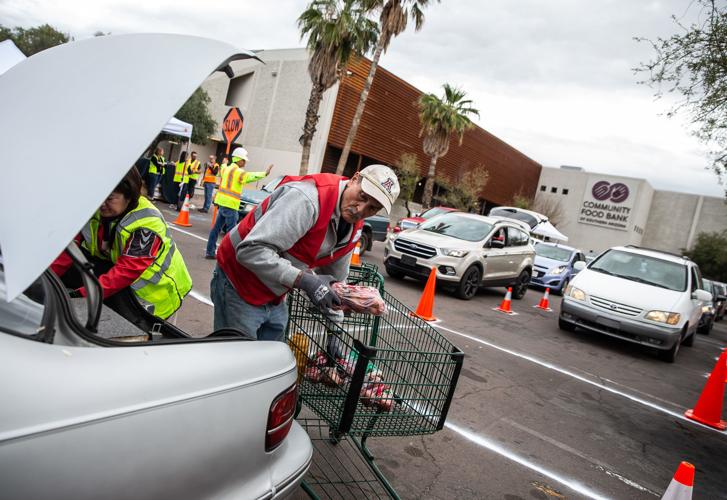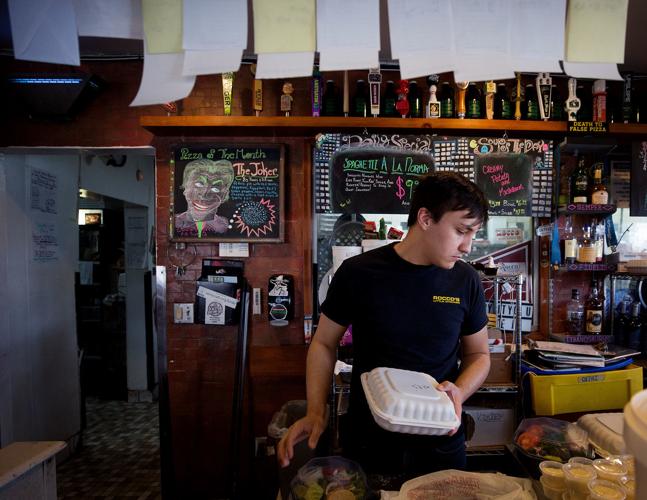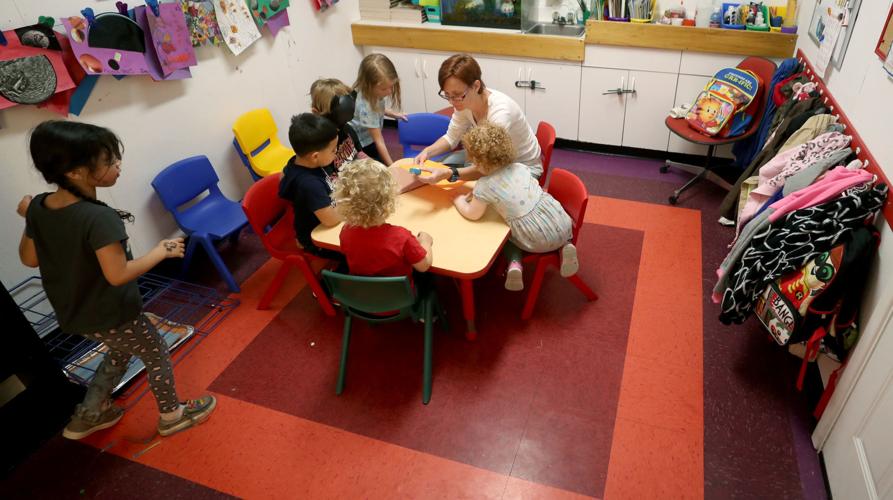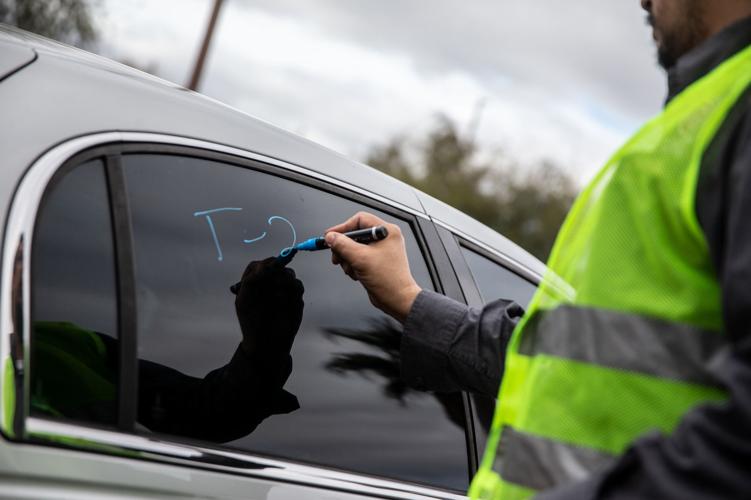After she found out Tuesday that she couldn’t work for two weeks, Amber Naab and her fellow bartenders drank. And when the bar closed hours later at 8 p.m., she went home and drank some more.
For 17 years, Naab has slung cocktails at the Chicago Bar, a decades-old haven for blues musicians in midtown Tucson. For the last six, she’s simultaneously tended the bar at the Bay Horse Tavern, another similar dive closer to the University of Arizona campus.
But after Tucson Mayor Regina Romero ordered the closure of bars and other businesses just after noon Tuesday, a move the mayor called “a painful decision,” Naab said she’ll spend the next two weeks at home, trying to figure out something else to do to pay her bills — and survive.
Naab is one of an estimated 29,000 restaurant and bar workers in Pima County who might be facing job loss or a reduction in hours, according to numbers provided by the Pima Association of Governments. People working in eating establishments and bars make up nearly 8 percent of total employment in the county.
Exactly how many people in Pima County have lost their jobs overall, or are facing decreased hours due to the outbreak of COVID-19, is not clear.
The Arizona Department of Economic Security did not provide unemployment numbers for the state or Pima County despite several requests by the Arizona Daily Star since Monday and the numbers online are outdated. Instead, all media inquiries to the DES have been directed to an email contact with the Arizona Department of Health Services.
If food assistance requests are any indication, things changed sharply on Tuesday and Wednesday, when the Community Food Bank of Southern Arizona saw a 55% increase in requests on each of those days compared with the same days last year.
Arizona At Work offices here have already seen a sharp increase in people coming in to file for unemployment benefits, and those numbers are expected to grow now that public libraries are closed and those computers are not available.
The two offices, at 2797 E. Ajo Way and 340 N. Commerce Park Loop, are open for now, but only six people are allowed to use the computers at a time. All employment-related classes are canceled until further notice.
Naab woke up Wednesday and tried to stay busy. She’s looked into grants from the local bartenders guild. She’s gotten an offer from a friend to clean houses. She’s heard drivers on Door Dash, a food-delivery service, are raking in the dough.
And she’s debated going on unemployment.
She doesn’t get paid time off and doesn’t know what will happen when — or if — businesses are allowed to open back up.
She understands the decision, but also doesn’t understand it. She ultimately just can’t believe she’s not working. It’s very scary, she said.
“I’m completely lost,” she said. “It’s like were living in a freaking movie — a really bad movie.”
“Uncharted territory”
For preschool owner Melissa Callahan, COVID-19 meant she didn’t pay her mortgage this week so she could pay her employees.
She’s not sure what she’s going to do next month.
Callahan worked for 11 years as an arts integration specialist with the Tucson Unified School District’s Opening Minds Through the Arts program before fulfilling her dream two years ago with the opening of Small Marvels, an arts-focused preschool.
She has four employees, and usually has about 24 to 30 youngsters in her school at 1403 E. Broadway.
That changed this week, and right now just two employees are getting hours because only 8 to 10 kids have been attending.
Many child-care centers and preschools in Pima County are still open, with permission from the county’s Health Department, but that will obviously change if they are ordered to close.
Callahan’s one hope is that since she’s licensed to have kids up to age 12, parents returning to work before schools reopen will need her help.
Callahan said in addition to reducing employee hours, there are growing concerns about finding supplies such as protective gloves for changing diapers and cleaning supplies to keep things sterile.
She heard rumors of stimulus funds being made available to small-business owners, but she said she hasn’t been able to find out anything concrete. She reached out to DES but hasn’t heard back yet.
For now, she said, it’s day by day.
“It’s been very, very tough telling two women they are not needed at work,” she said. “I never even considered such a thing happening. We are in uncharted territory.”
“A little more innovative”
Some business owners in Pima County are seeking creative ways to stay open without putting customers at risk.
One example is Spadefoot Nursery, which is owned by Jared McKinley and his wife, Katie Gierlach. The couple started their business last summer, never imagining that what was supposed to be their first busy season would occur at the same time as a pandemic.
Earlier this week, the couple closed their store at 2831 E. Broadway and today they will start doing online sales.
The couple will be offering drive-up service so people can stay in their cars and get the plants with minimal contact.
People who look online at spadefootnursery.com can see what the plants look like now and what they will look like after they mature more, McKinley said.
“This is usually a time when we rake it in. It couldn’t have been worse timing,” he said.
“When the seriousness of the virus became apparent, we decided to do something a little more innovative.”
Learning new things is the name of the game
Katie Piccioli was working as a bartender at Prep and Pastry when the restaurant transitioned from full service to takeout only on Tuesday.
Piccioli said the restaurant owner and management have gone out of their way to help employees keep working, including possibly having Piccioli do some food delivery.
“They are working really hard to keep a certain number of employees doing any odd jobs,” she said. “They are trying to think of ways to keep their employees afloat during this time.”
For now, nothing is certain.
“We don’t know yet if we’ll work at all since this just happened yesterday,” Piccioli said, “but they’ve definitely made me not feel alone or on the outs at this time.”
Piccioli said as she figures out what to do in the weeks ahead, she is feeling worried about how many Tucson restaurants might never open up again.
“In the realistic time frame, it’s not going to be just two weeks,” she said, “and I think everybody knows that.”
At Rocco’s Little Chicago, patrons flocked into the restaurant around lunch-time to pick up phone orders, taking pizzas and wings to go.
Logan Rios manned the cash register at the bar. He said he showed up to work and found a note from the restaurant’s owner, Rocco DiGrazia, at the bottom of the schedule. It said, “If you need money, or food, let me know.”
He’s worked at the restaurant for six years, elevating to a waiter. But the changes forced him to the counter, and potentially out for delivery.
He expected the changes. His siblings live in Illinois, where similar restrictions have been placed on restaurants. He admitted he’s pretty good with money and has at least two months’ rent saved.
“I’m not real concerned,” he said, “yet.”

